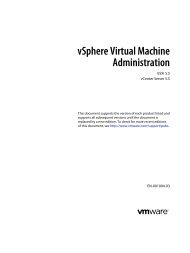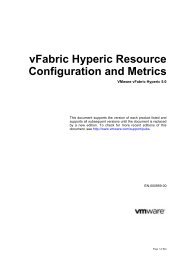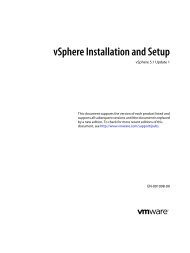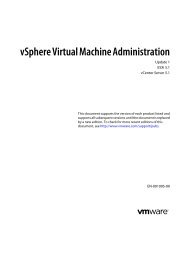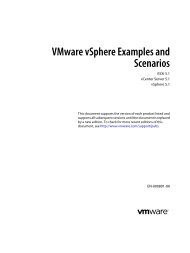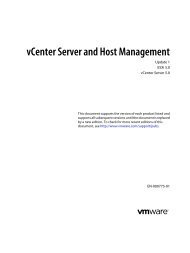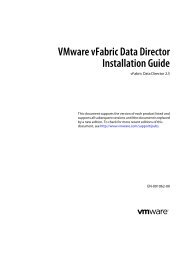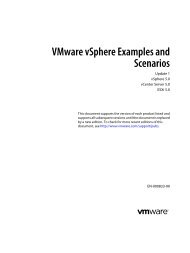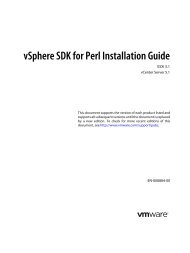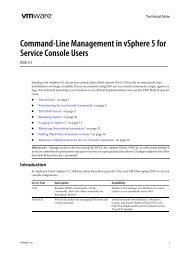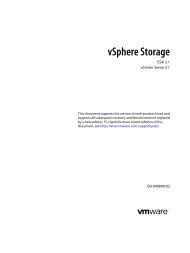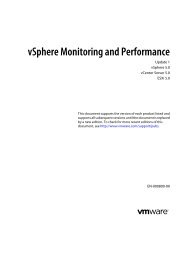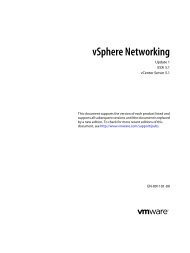vSphere SDK for Perl Programming Guide - Documentation - VMware
vSphere SDK for Perl Programming Guide - Documentation - VMware
vSphere SDK for Perl Programming Guide - Documentation - VMware
You also want an ePaper? Increase the reach of your titles
YUMPU automatically turns print PDFs into web optimized ePapers that Google loves.
23 print Dumper ($host_view->summary->config->product) . "\n\n\n";<br />
24<br />
25 print Dumper ($host_view->summary->config) . "\n\n\n";<br />
26<br />
27 print Dumper ($host_view->summary) . "\n\n\n";<br />
28<br />
29 # logout<br />
30 Vim::logout();<br />
Chapter 3 Refining <strong>vSphere</strong> <strong>SDK</strong> <strong>for</strong> <strong>Perl</strong> Scripts<br />
When you run the entire program, it produces detailed output. The output from line 23 looks as follows:<br />
$VAR1 = bless( {<br />
'apiType' => 'HostAgent',<br />
'apiVersion' => '4.0.0',<br />
'build' => '31178',<br />
'fullName' => '<strong>VMware</strong> ESX Server 3.0.1 build-31178',<br />
'localeBuild' => '000',<br />
'localeVersion' => 'INTL',<br />
'name' => '<strong>VMware</strong> ESX Server',<br />
'osType' => 'vmnix-x86',<br />
'productLineId' => 'esx',<br />
'vendor' => '<strong>VMware</strong>, Inc.',<br />
'version' => '3.0.1'<br />
}, 'AboutInfo' );<br />
The output above shows the content of the summary.config.product property of a HostSystem managed<br />
object. The type (or more properly class) of summary.config.product property is AboutInfo. <strong>Perl</strong>’s<br />
Data::Dumper module writes the object in a <strong>for</strong>m that can be used with eval to get back a copy of the original<br />
structure. The bless keyword indicates the data is a <strong>Perl</strong> object, and the last argument to bless is the class of<br />
the object, AboutInfo.<br />
Line 19 (in Example 3‐4) retrieves the HostSystem view object and line 21 prints the name associated with the<br />
corresponding host.<br />
The config property has more values than those printed by line 23. Line 25 prints the entire config object.<br />
Inside the config object printed by line 25 (in Example 3‐4), the product property is an object. The bless<br />
function returns a reference to the product object, which is itself nested inside the config object.<br />
$VAR1 = bless( {<br />
'name' => 'test-system.eng.vmware.com',<br />
'port' => 'nnn',<br />
'product' => bless( {<br />
'apiType' => 'HostAgent',<br />
'apiVersion' => '4.0.0',<br />
'build' => '31178',<br />
'fullName' => '<strong>VMware</strong> ESX Server 3.0.1 build-31178',<br />
'localeBuild' => '000',<br />
'localeVersion' => 'INTL',<br />
'name' => '<strong>VMware</strong> ESX Server',<br />
'osType' => 'vmnix-x86',<br />
'productLineId' => 'esx',<br />
'vendor' => '<strong>VMware</strong>, Inc.',<br />
'version' => '3.0.1'<br />
}, 'AboutInfo' ),<br />
'vmotionEnabled' => 'false'<br />
}, 'HostConfigSummary' );<br />
The output from line 27 of Example 3‐4 prints the structure of the entire summary object of the host view. The<br />
output shows a number of nested objects, including two objects that are nested two levels deep. The product<br />
object is nested inside the config object, and the connectionState object is nested inside the runtime object.<br />
Specifying Untyped Arguments in Scheduled Tasks and Callbacks<br />
Because of the way <strong>vSphere</strong> <strong>SDK</strong> <strong>for</strong> <strong>Perl</strong> maps the <strong>vSphere</strong> API into <strong>Perl</strong>, you have to specify arguments to<br />
callback methods differently from the way you specify arguments to other methods. You can use PrimType to<br />
specify untyped arguments in scheduled tasks and callbacks.<br />
<strong>VMware</strong>, Inc. 39



